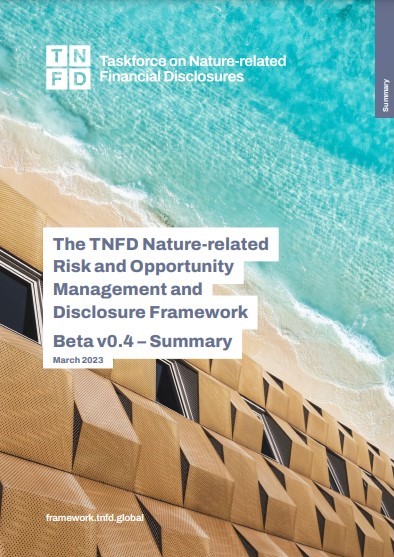Author: Zili Duniya Bungwon
Date: 17 April 2023
On 28th March the Taskforce on Nature-related Financial Disclosures (TNFD) released the fourth and final prototype of its framework, which will be followed by its final recommendations in September 2023. The first three beta versions of the TNFD’s framework were released in 2022, followed by market pilot testing, stakeholder consultation and feedback that informed each successive version. The TNFD has now updated all core components of the framework with a range of supporting guidance.

Recommended disclosures
Three new requirements have been added to the general requirements that cut across the four disclosure pillars. These prompt the disclosing organisation to set out its approach to materiality, consider its nature-related disclosures in relation to other sustainability issues, as well as stakeholder engagement.
Companies need to have clarity on the relevant threshold of materiality applicable when assessing foreseeable biodiversity risks, opportunities, impacts and dependencies in relation to their financial performance, stakeholders and prospective investors. Understanding and overseeing implementation of this approach is crucial to directors’ discharge of their fiduciary duties. Therefore it makes sense for this requirement to be overarching.
The new requirement to identify any alignment, contributions and possible trade-offs between nature-related and other sustainability-related disclosures will promote a holistic approach to sustainability-related risk management. It should minimise negative unintended consequences arising from progress in one area of sustainability and materialising in another. Making this pervasive across disclosures (rather than one disclosure) will enable companies to address related risks that could impact the company’s long-term financial performance.
Through engaging with stakeholders including employees, investors, customers and Indigenous communities, directors can better understand nature-related stakeholder expectations and concerns. This will aid in prioritising sustainability efforts, demonstrating commitment to accountability and transparency and reducing the likelihood of legal and reputational risks. It will also enable companies to link disclosures to more comprehensive social requirements from other frameworks (for example the proposed Task Force on Inequality-related Financial Disclosures (TIFD)).
The 15 recommended disclosures in v0.3 have now been streamlined to 14. The TNFD has retained all 11 disclosures adapted from the Task Force on Climate-Related Financial Disclosures (TCFD) framework. This alignment should encourage and support market participants to implement nature-climate integrated disclosures. Of the previous nature-specific disclosures:
- Two remain, covering priority locations and stakeholder engagement, with revised wording. This includes clarifying criteria on which interactions with ecosystems should be disclosed (previously low integrity ecosystems, high importance ecosystems or areas of water stress, now high integrity ecosystems, areas of rapid decline in integrity, areas of high biodiversity importance, areas of water stress and areas where the organisation is likely to have significant potential dependencies or impacts). This avoids excluding company activities that present significant nature related issues.
- Risk and Impact Management A has been split into two disclosures to allow different approaches for direct operations and value chain. This recognises the short to medium term challenges in value chain reporting but emphasises the importance of value chain disclosure.
- Two have been incorporated elsewhere.
- Risk and Impact Management D is incorporated into A. To translate the concept of Scopes used in emission reporting with a clearer articulation for nature, the phrase ‘source of inputs’ was changed to ‘upstream, downstream and financed’.
- Metrics and Targets D on alignment of nature and climate targets has been elevated to an overarching requirement and expanded to include all sustainability issues.
LEAP
The TNFD’s LEAP (Locate, Evaluate, Assess, and Prepare) approach provides an optional structure through which companies and financial institutions can identify and assess nature-related risks and opportunities to prepare their disclosures. However, not everything evaluated using the LEAP approach is recommended to be disclosed and it is not only for those disclosing, but for use by companies and financial institutions of all sizes, across all sectors. Not understanding their company’s interface with biodiversity is a blind spot that directors cannot afford to ignore, regardless of whether their company is making disclosures. Directors around the world have duties, rooted in national company laws, to consider material risks to their company.
Updated LEAP guidance for identifying priority locations reflects that organisations may encounter risks from their activities in areas with certain characteristics, especially when their activities span across various territories/sectors and consist of complex value chains. Its inclusion of locations where the company has potential significant dependencies or impacts on nature, regardless of the underlying health of the ecosystem, echoes the ‘double materiality’ approach already introduced in the disclosure requirements. (Double materiality considers both the impact of the environment on the company and the impact of the company on the environment). Directors can prioritise further analysis into activities in these locations, which may create opportunities and provide a degree of protection from potential risks.
Stakeholder engagement
New technical guidance accompanying the disclosure framework advises on engagement with affected stakeholders. This references existing environmental and human rights due diligence standards, the types of affected stakeholders (including Indigenous communities) and recognises the interrelated impacts and dependencies between nature, people and climate, and their interaction with the economy and finance. As has been seen in climate-related litigation, which often includes social elements, nature-related corporate activity can include human rights issues. A holistic approach to managing socio-environmental risks could protect companies and their directors from, or enable mitigation of, legal, financial and reputational risks.
Approach to metrics
New guidance on ‘response metrics’ covers management of nature-related dependencies, impacts, risks and opportunities, including actions, policies, commitments, plans and targets. This gives companies a means to track effectiveness of nature-related actions and strategies, identify areas for improvement and address nature-related impacts and dependencies. Response metrics provide investors and other stakeholders with important information on a company’s environmental performance. This will help companies to meet sustainability goals and improve their reputation, enabling directors to fulfil their duties to promote the success of the company. For best practice, the metrics align with the Science Based Targets Network framework and the Global Biodiversity Framework.
Other updates
The TNFD has included new concepts and definitions, and updated its glossary with relevant definitions. New guidance on target setting and scenario analysis have been released. Additional guidance for specific sectors (financial institutions, mining & metals, agriculture & food, and energy) and biomes (tropical forests, rivers and streams, intensive land use systems and marine shelf) includes sub-sectors and sub-biomes. As illustrated in case studies to CCLI’s report: Biodiversity Risk: Legal Implications for Companies and their Directors, agriculture (particularly in relation to intensive land use) and construction (fed by the mining and metals industries, often active in tropical forests, areas of water stress and the ocean) have some of the biggest impacts on biodiversity.
The TNFD invites market participants and other stakeholders to provide feedback on v0.4 until 1st June 2023. Such feedback will be critical to optimising the framework for fast adoption by companies and financial institutions. The easier the adoption, the more swift and effective will be the identification and mitigation of impacts and dependencies on biodiversity, reducing corporate and financial risks and creating opportunities to promote a transition to a nature-positive and regenerative economy. A robust, user-friendly framework will similarly make it easier for states to implement their commitment in Target 15 of the Global Biodiversity Framework (to support and require nature-related financial disclosures) and for directors to understand and fulfil their company law duties in relation to biodiversity risk.
